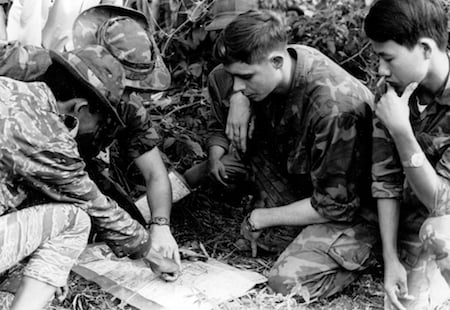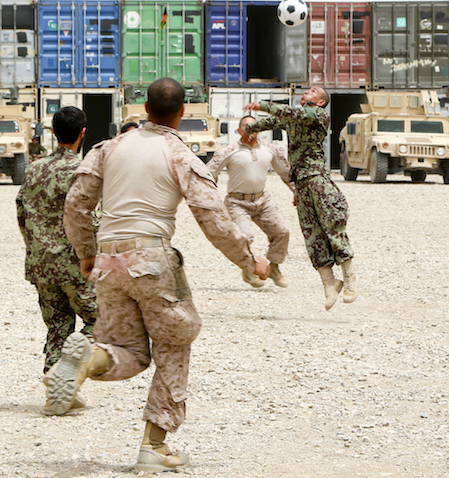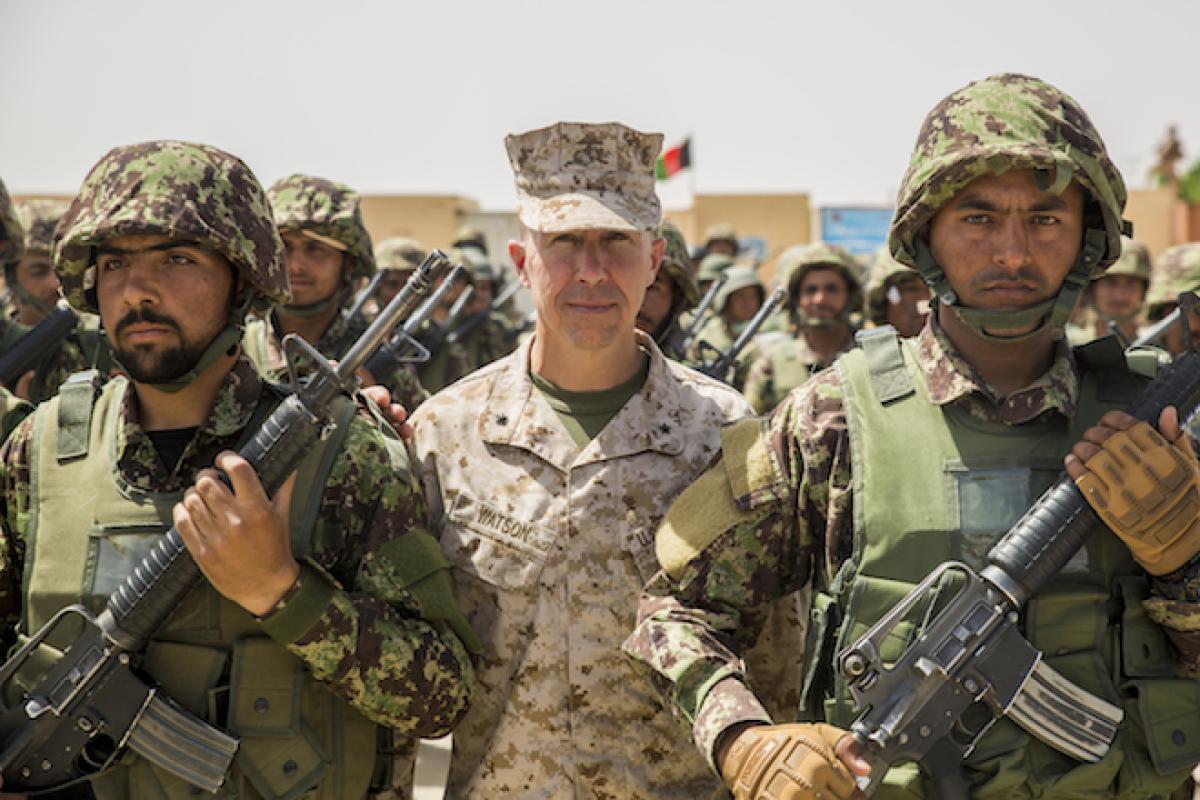At the outset of an irregular war in Vietnam, President John F. Kennedy explained to the West Point class of 1962 that the military would need to be not only proficient in traditional tactics, but also culturally savvy in partnering with foreign security forces. As President Kennedy described it, this type of mission would require “a whole new kind of strategy, a wholly different kind of force, and therefore a new wholly different kind of military training.” When the President delivered this speech, the U.S. Marine Corps already had been partnering with foreign security forces for nearly 50 years. Today, more than a half century later, the Marine Corps continues to deploy teams worldwide to advise, assist, and train foreign partners.
Despite its years of experience, the Corps continues to struggle to develop a coherent and effective way to identify, train, and employ advisors. It has made significant strides. It institutionalized advisor language and skills training centers, created a military occupational specialty (MOS) code to track Marines who have experience or formal training as advisors, and established a permanent advisor regiment. However, one crucial lesson from the past is still overlooked: Every Marine is not cut out to be an advisor. Moreover, every Marine should not be an advisor.
The skills necessary to be effective in this capacity extend beyond professional proficiency and an “ooh-rah” mentality. The Marine Corps must adopt a screening and selection program to identify Marines with the qualifications to be effective foreign security force advisors. Without a formalized selection and training process, it runs the risk of mission failure.1
Advising Is an Investment
When combat operations are required, U.S. efforts are enhanced by capable and committed foreign security forces. While most Marines train to execute the six warfighting functions, an advisor is prepared to execute a seventh—provide guidance and counsel to a foreign partner. Advising activities deter transnational criminal organizations (terrorists) by presenting the credible threat of U.S. and foreign security force partners working in tandem. The advise, assist, and train initiatives ensure U.S. allies are force multipliers in combat operations and provide the United States with access to air, land, and sea lines of communications. As foreign partner capabilities and capacity increase, the needle moves closer to a state where U.S. intervention is not necessary; the foreign security force can manage and quell internal conflicts without external involvement.

A U.S. Marine points out an enemy supply route to a member of the South Vietnamese Popular Force. During the Vietnam War, advisory group Marines who were selected based on their skills and ability to communicate across cultures were able to better influence Vietnamese military culture.
The Banana Wars & Vietnam
Modern-day Marines first engaged in advisor activities in the 20th century during the Banana Wars. Marines organized, trained, advised, and commanded indigenous forces and administered many public services and civilian government functions.2 The after-action reports revealed that certain personality traits were necessary to be successful as an advisor, as they affected the ability of the Marine to communicate, negotiate, and come to a positive resolution with his counterpart.3
This also was proven true in the Vietnam War, which presented the Marine Corps with the unique opportunity to analyze two programs—the Marine Advisory Group and the Combined Action Program (CAP). CAP personnel initially were “mature and highly motivated” Marines from line infantry companies with previous combat experience.4 But volunteer rates decreased, the requirement for combat experience was removed and Marines began to be assigned from combat support units—the qualifications and experience standards were relaxed. Subsequently, commanders often used this opportunity to get rid of underperforming Marines.5
In contrast, the advisory group Marines were selected based on their skills and ability to communicate across cultures. These Marines were sought out not just for their tactical and technical expertise, but also their interpersonal skills, which would facilitate productive engagements. The result was a CAP initiative that never achieved its full potential and a Marine Advisory Group program that eventually saw its influence begin to take hold in the military culture of the Vietnamese Marine Corps.6
Iraq & Afghanistan
Initially, the primary advisor role in Iraq was training the Iraqi Army; however, the mission later expanded to include advising them in combat. One of the first obstacles was identifying enough Marine advisors to fill the billets. Many of those selected were unqualified for the role. During their predeployment workups, little time was devoted to teaching how to advise, and most ended up employing a trial-and-error method. Advisors who recognized, accepted, and adapted to the reality that personal relationships held more value than professional interactions made more progress; those who did not were less successful.7
Over the past decade, screening and proper predeployment training for Marine advisors headed to Afghanistan have been the exception and not the rule. Tasking of Marines to fulfill this mission continues to be done on an ad hoc basis. Who is available? Who can spare a team of Marines? As was the case with the Vietnam-era CAP initiative, these teams often are sourced from across the force with little regard for qualifications other than a willingness/ability to deploy—advisor missions are still treated as afterthought operations.
Winnowing Potential Advisors
Identifying Marines who are capable of succeeding in the advisor role is the single most important step in ensuring mission accomplishment. While training can heighten motivation and sharpen skills, the skills have to be there naturally; the most successful advisors are those whose “life experiences and personality have qualified them for the role.”8 Marines who lack the right temperament and who do not possess the professional skills and personality traits required to do the job will not be successful.9
As an organization, the Marine Corps has become wed to the idea that if a Marine is physically fit/combat fit, can recite Corps history, is proficient at his or her military occupational specialty, knows combat tactics, can drill and is motivated, then he or she is a plug-and-play Marine—able to handle whatever task is assigned. That is not the case.
One Marine Corps unit has attempted to screen its advisor candidates for just that reason. In 2006, when 3d Marine Division began to identify Marines to serve as embedded advisors, it looked for good interpersonal skills, the ability to build enduring relationships, and proven track records in training and instruction; finding Marines who were not just focused on combat but also inclined to engage peacefully with foreign populations and indigenous peoples.10 By identifying and searching for these unique character traits, 3d Division was able to locate qualified personnel from within its organization, retain them upon redeployment, and use their institutional knowledge to identify and train future advisors.11
The Corps must elevate the level of screening and training for advisors from just knowing how to disassemble and maintain a weapon system, to identifying Marines who have the natural inclination to develop and sustain a partnership with allied countries. Something as minor as an application could provide insight into whether a Marine has the aptitude to be successful in an austere environment. Marines submit packages for recruiting duty, drill instructor duty, Marine security guard duty, and special operations. Why shouldn’t they submit packages and be board screened for foreign security force advisor duty?

U.S. Marines and Afghan National Army soldiers show camaraderie during a soccer game following a tactical procedures exercise. It is important that Marine advisors recognize that personal relationships can add more value than professional interactions in foreign advisory deployments.
Marines Should Be Picky
Not every Marine is suited to be an advisor. More than almost any other position in the military structure, the role implies a relationship between two individuals, and that relationship depends more on personality, psychology, and intangible factors than it does on a personnel record or technical expertise. While cultural and political knowledge can be gained through study and observation, advisors must have the personality, professional competence, patience, tact, emotional and psychological stability, temperament, self-discipline, self-sufficiency, and interests to excel in the foreign environment in which they will find themselves.12
To maximize success, the Marine Corps must treat the advisor billet as a special duty assignment. Using the existing templates for other special duty assignments and specialized programs, the Marine Corps should immediately implement a board screening and selection process to ascertain the presence or potential for those intangible factors.
The goal should be to attract Marines who want to be advisors. Failure to do so is a disservice to our foreign partners as well as to those Marines who, through no fault of their own, are being set up for failure or lackluster results.
1. Department of the Army, U.S. Army Field Manual 3-07.1, “Security Force Assistance” (Washington, DC: Government Printing Office, 2009), 8-3.
2. William Rosenau, et al., “United States Marine Corps Advisors: Past, Present, and Future,” CNA Analysis & Solutions, Strategic Studies (August 2013).
3. James H. McCrocklin, Garde d’Haiti: Twenty Years of Organization and Training by the United States Marine Corps (Annapolis, MD: Naval Institute Press, 1956), 205.
4. Bruce C. Allnutt, Marine Combined Action Capabilities: The Vietnam Experience (McLean, VA: Human Sciences Research, Inc., December 1969), C-1.
5. Allnutt, Marine Combined Action Capabilities, C-3.
6. Rosenau, “United States Marine Corps Advisors,” 31.
7. Rosenau, “United States Marine Corps Advisors,” 53.
8. G. C. Hickey, “The American Military Advisor and His Foreign Counterpart: The Case of Vietnam” (Santa Monica, CA: Rand Corporation, 1965), 28.
9. Richard H. Hetherington, “Foreign Military Advisory Proficiency: The Need for Screening, Selection and Qualification,” U.S. Army Command and General Staff College (2009), 61.
10. Rosenau, “United States Marine Corps Advisors,” 73.
11. Rosenau, “United States Marine Corps Advisors,” 74.
12. Michael J. Metrinko, “The American Military Advisor: Dealing with Senior Foreign Officials in the Islamic World,” Peacekeeping and Stability Operations Institute & Strategic Studies Institute (August 2008), 18.



